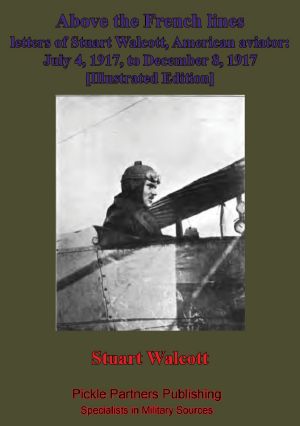Above the French Lines

- Authors
- Walcott, Stuart
- Publisher
- Pickle Partners Publishing
- ISBN
- 9781782891178
- Date
- 2015-09-27T00:00:00+00:00
- Size
- 0.70 MB
- Lang
- en
". . . On December 12, while on patrol, Stuart Walcott met a German biplane carrying two men. Three cable reports agree that he shot down and destroyed this machine about two and a half miles within the German lines. He then started back for the French lines and was overtaken by four Albatross German planes . . . ."
During World War I, Stuart Walcott (1896-1917), a young Princeton student who heard the call to arms prior to April, 1917, and who made the supreme sacrifice, wrote most interesting letters concerning his experiences, from the moment he started his flying tuition until shortly before the end, and these letters were collected and published in 1918 in a small volume under the title "Above the French Lines." The letters tell in a chatty human way the life of the first band of bird men who went to France, and through it runs a vein of information which everyone going "over there" should have. Besides being instructive, the reader will find it immensely interesting.
In common with the majority of the youth of America, he had the feeling that it was a patriotic duty and privilege to offer personal service to the Nation when its ideals and motives were assailed by a foreign foe. He first offered his services to the Signal Corps and received a temporary appointment. Realizing that training as an expert aviator could be more quickly obtained in France than in this country, he went to France and enlisted in the French Army with the expectation of being transferred later to the American forces. This would have been done prior to his being shot down within the German lines on December 12, had he not been awaiting action by the United States Aviation Service in France in examining and arranging for the transfer of the American aviators in the French Army to the service of the United States.
Throughout his life the dominating thought was to be of positive service wherever he might be placed. Both at home and in school his actions were largely influenced by a determination first to know what was the right thing to do, and guided by this habit, when it looked as though the United States would enter the European War, he decided that it was his duty to take part in it. When the Lusitania was sunk he felt strongly that the United States should take a positive stand in favor of the freedom of the seas, that the rights of Americans should be protected even if it meant war, and he was ready to fight for it.